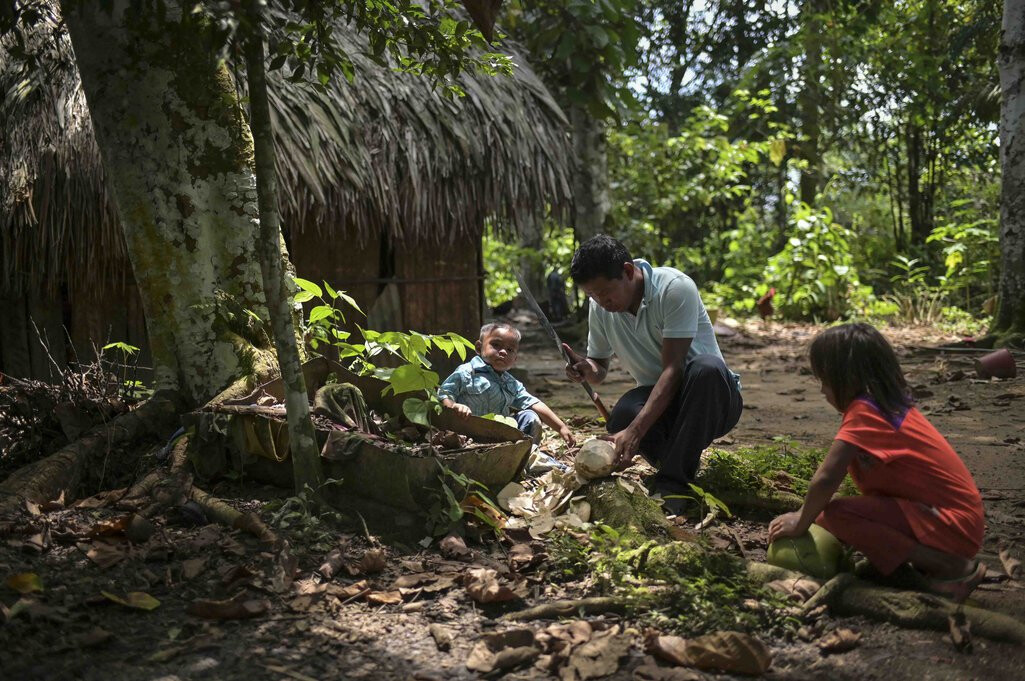
Bogotá, Colombia - In a historic move for the protection of isolated Indigenous communities, Colombia has officially created a 2.7-million-acre (1,092,849-hectare) territory in the heart of its Amazon rainforest. This unprecedented designation is specifically designed to safeguard the uncontacted Yuri-Passé people who inhabit the remote region between the Caquetá and Putumayo Rivers in the southern department of Amazonas.
This landmark territory marks the first time Colombia has established a protected area with the primary goal of ensuring the well-being and autonomy of Indigenous people living in voluntary isolation. The initiative comes in response to increasing threats from illegal activities such as mining and the encroachment of organized crime, which have put pressure on neighboring Indigenous communities and, indirectly, on the isolated Yuri-Passé.
"Through this resolution, Colombia is taking a key step towards the protection of the rights and territory of Indigenous groups in isolation, reaffirming its commitment to their autonomy and survival," stated the Amazon Conservation Team (ACT), a key organization that collaborated in the creation of the territory.
The newly established protected zone strictly prohibits economic development activities and any form of forced contact with the Yuri-Passé people. Significantly, a portion of the territory overlaps with the existing Río Puré National Park, and an adjacent buffer zone will be implemented to act as a transitional area, further limiting external disturbances.
Years of Advocacy Lead to Historic Decision
The creation of this vital territory is the culmination of years of dedicated advocacy by human rights organizations and conservation groups. These efforts focused on establishing legal frameworks that recognize the unique rights of Indigenous peoples living in isolation and developing effective mechanisms for the protection of the lands they depend on for their survival.
Confirmation of the presence of uncontacted groups in this remote area, near the borders of Peru and Brazil, came from the Ministry of Interior just last year. However, neighboring Indigenous communities, who maintain contact with the outside world, have long been aware of the isolated groups and have sought government protection for them for decades. Trust issues with the government sometimes led these communities to be hesitant in sharing information about the location of the uncontacted groups, according to ACT.
An incident in 1969, where military officials captured an Indigenous family believed to be living in isolation, only to release them back into the forest after a brief period in a nearby town, underscored the vulnerability of these groups and the lack of protective measures. This event was followed by years without official confirmation of their continued presence.
Precautionary Measures and Growing Threats
In 2002, recognizing the potential presence of uncontacted groups, the Colombian government established Río Puré National Park as a precautionary measure, providing a basic level of protection to any unknown Indigenous inhabitants.
However, by 2010, escalating pressures from illegal mining operations and organized crime in the region prompted neighboring Indigenous communities to directly appeal to the government for assistance in safeguarding the isolated groups. This led to a dedicated research project aimed at confirming the existence of the Yuri-Passé and advocating for the creation of a protected territory.
A pivotal moment arrived in 2018 when the government issued a decree outlining the establishment of "intangible zones" for the protection of isolated peoples, even within existing national parks. This decree provided the legal foundation for civil society organizations, researchers, and Indigenous communities to collaboratively establish the new territory.
Indigenous Leadership a Key Victory
Notably, the leadership of neighboring Indigenous communities throughout this entire process is being hailed as a significant victory. It underscores the crucial role that Indigenous peoples can and should play in the protection of isolated groups and demonstrates the effectiveness of their advocacy in achieving tangible results.
"The whole process was established and developed by Indigenous people, which is very important," an ACT spokesperson emphasized. "It wasn’t the state that did the whole process and then set up the consultation with Indigenous authorities at the end. It was the other way around."
Biodiversity Hotspot Also Under Protection
Beyond its crucial role in protecting the Yuri-Passé, the newly established territory also encompasses a region of exceptional biodiversity. Over 600 species have been recorded in the area, including vulnerable species such as the Oncilla (Leopardus tigrinus), giant armadillo (Priodontes maximus), and giant anteater (Myrmecophaga tridactyla).
Challenges Remain in Ensuring Protection
Despite this significant step forward, challenges remain. Park ranger presence in Río Puré National Park was suspended in 2019 due to security threats from organized crime, leaving the area reliant on remote monitoring technologies and the vigilance of Indigenous communities. The new territory will also operate without government rangers in the immediate future.
However, advocates are hopeful that the formal recognition of this territory for isolated groups will bring increased attention to the region and spur greater government action to protect both the vital ecosystems and the vulnerable people who call it home.
"The park right now is orphaned, in a way, so we hope that these types of resolutions and these types of decrees and judicial orders…will translate into a coordinated effort so that the park rangers can come back," the ACT spokesperson stated.
The creation of this territory represents a significant advancement in the protection of uncontacted Indigenous groups globally and sets a powerful precedent for other nations grappling with similar challenges. It underscores the importance of respecting the self-determination of isolated communities and safeguarding their ancestral lands from external pressures.
[Copyright (c) Global Economic Times. All Rights Reserved.]




























